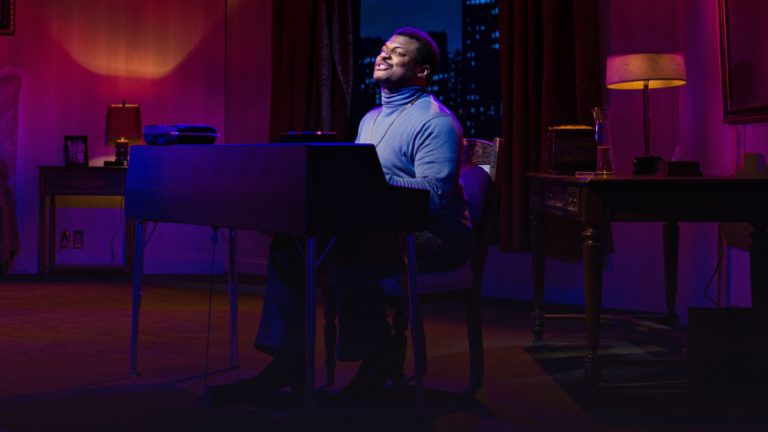 There’s a transcendent moment in “Twisted Melodies,” the one-man Donny Hathaway show by Kelvin Roston Jr. at Mosaic Theater Company, in which the audience and performer are one, singing and clapping to “The Ghetto,” under his direction, and getting a groove on.
There’s a transcendent moment in “Twisted Melodies,” the one-man Donny Hathaway show by Kelvin Roston Jr. at Mosaic Theater Company, in which the audience and performer are one, singing and clapping to “The Ghetto,” under his direction, and getting a groove on.
Already Roston’s Hathaway has broken the fourth wall and recognized the audience surrounding him in his Essex House hotel room. To him, they are either an apparition of fervent fans (something composers might have in mind when writing new songs alone) or better yet, as a team of encouraging angels.
A brilliant songwriter and performer who came of age at Howard University, where he met both his wife and his recording partner Roberta Flack, Hathaway may be the least well known R&B figure to get a satisfying biographical, musical show, but that’s what makes “Twisted Melodies” all the more welcome.
For all we know, Roston is a spitting image of the elusive Hathaway (and with cap and suit, it turns out he kind of is). And his standout songs are great to hear in any era, from “The Closer I Get to You” to “The Ghetto.”
His soulful “This Christmas” which slowly became a holiday standard, and is heard briefly in the show. But a lot of his songs fit in well with his own personal struggles, from the throbbing “I Love You More Than You’ll Ever Know,” to the enduring “Someday We’ll All be Free,” whose opening lines spoke to his own worsening mental condition: “Hang on to the world as it spins around / Just don’t let the spin get you down.” And finally, the shattering “Giving Up.”
(And if you’re thinking, “Where is the ‘Where is the Love?'” it’s the one classic that’s missing).
Holed up in his hotel room, Hathaway is hearing voices and some pounding on the wall and fears a machine is trying to take over his mind and songwriting ability. This is due to a diagnosis of paranoid schizophrenia, which he is supposed to tame with a phalanx of pills. But in Derrick Sanders’ direction, he empties hundreds of pills on the floor, suspecting they’re part of the plot as well.
As disturbing as this all is, we do hear stories of his gospel-influenced childhood, and his time at Howard, which gets an appreciative response in D.C., the latest city to host the show developed in Chicago’s Congo Square Theater, Baltimore Center Stage and the Apollo Theater in New York.
Although his voice does not have the exact smooth timbre of his subject, Roston has strong pipes and apparently adept at the electric keyboard in his room (he’s backed by other instruments, which are on recorded tracks, that necessarily stilt the performances the way canned music does).
Courtney O’Neill’s set is homage to late 70s hotel, but equipped for some neat surprises, including a door that seemingly disappears mid-show. The big window is a constant, and after we were reminded in the program it’s how he fell to his death from 15 floors in 1979, it sits there ominously throughout the depiction of his final 24 hours.
Mike Tutaj’s projections of shadows and static effectively replicate the mental haze of the artist, as do the echoes in Christopher M. LaPorte’s sound design.
But it’s the empathetic Roston who carries the show and in fact wrote it, suggesting convincingly it was the quirks in Hathaway’s mind that created both the music we love and the life that tortured him.
The actor gets a deserved ovation at the end (but still I would have loved to hear an encore of the enduring question “Where is the Love?”).
“Twisted Melodies” continues through July 21 at the Mosaic Theater, operating at the Atlas Performing Arts Center, Washington, DC.